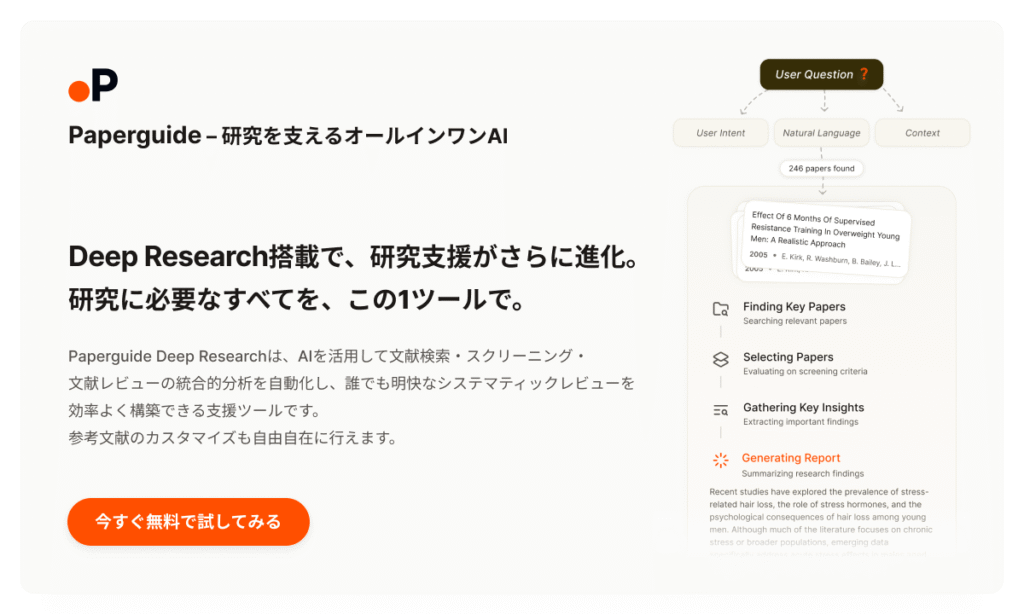 Akanon
AkanonHello. I am the operator of this site, Akanon (@ HAcademianote(The following is a brief description of the project).
This article provides a wide range of information for aspiring researchers, from an overview to how they work and their aptitudes.
If you read it, you will get an idea of what it is like to work as a researcher.
Please read through to the end.
Please click backslash!
What is a researcher?
A researcher is a person who discovers new knowledge and technology and studies ways to apply it.
The methods vary.
Examples of Researchers
- Experiment.
- Investigate phenomena of nature, living organisms, etc.
- Examine documents, books, and artifacts from the past.
- Computer development using programming, etc.
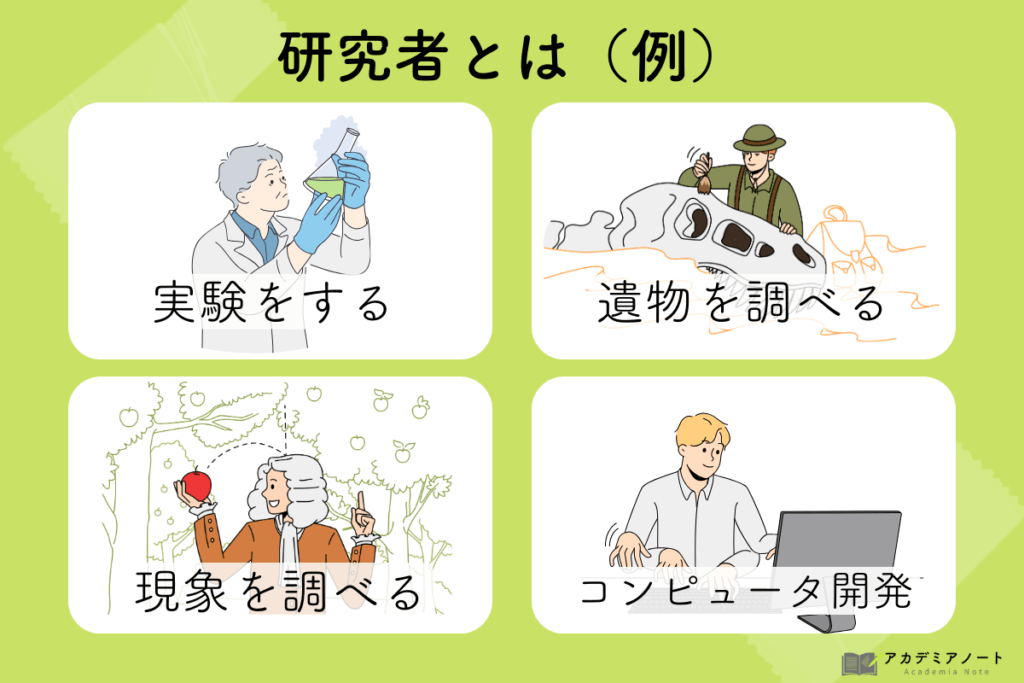
 Akanon
AkanonThere are many different styles, but all are researchers.
What research fields are available?
Our research areas range from the humanities to the sciences.
To give you an idea of how many research fields there are, we have listed them all below.
- Humanities (literature, history, geography, culture, etc.)
- Social sciences (politics, law, economics, education, etc.)
- Mathematical and physical sciences (mathematics, elementary particles, astronomy, etc.)
- Chemistry (physical chemistry, organic chemistry, etc.)
- Engineering sciences (mechanics of materials, nuclear engineering, electrical and electronic engineering, civil engineering, etc.)
- Informatics (e.g., information science)
- Biological sciences (biology, neuroscience, etc.)
- Agricultural and environmental sciences (agricultural chemistry, production and environmental agriculture, forest area science, veterinary medicine, etc.)
- Medical, dental and pharmaceutical sciences (pharmacy, pathology, internal medicine, surgery, nursing, sports science, etc.)
 Akanon
AkanonAll the knowledge, goods, medicine, and services we have today are the result of the accumulation of researchers who have
What is the difference between a researcher and a scientist?
Scientists are part of the research community and refer to those who specialize in the natural sciences.
The image of a scientist is similar to that of a researcher, who wears a so-called white lab coat and conducts experiments with test tubes and flasks.
There is no clear definition, nor is the term used differently in the research community.
There are three types of research
Research can be classified into three categories.
| ① basic research | Research that advances our understanding of a particular theory, phenomenon, or natural law |
| ② applied research | Research to convert the results of basic research into technology that can be put to practical use |
| ③ Development Research | Research that is primarily focused on the development of products and services |
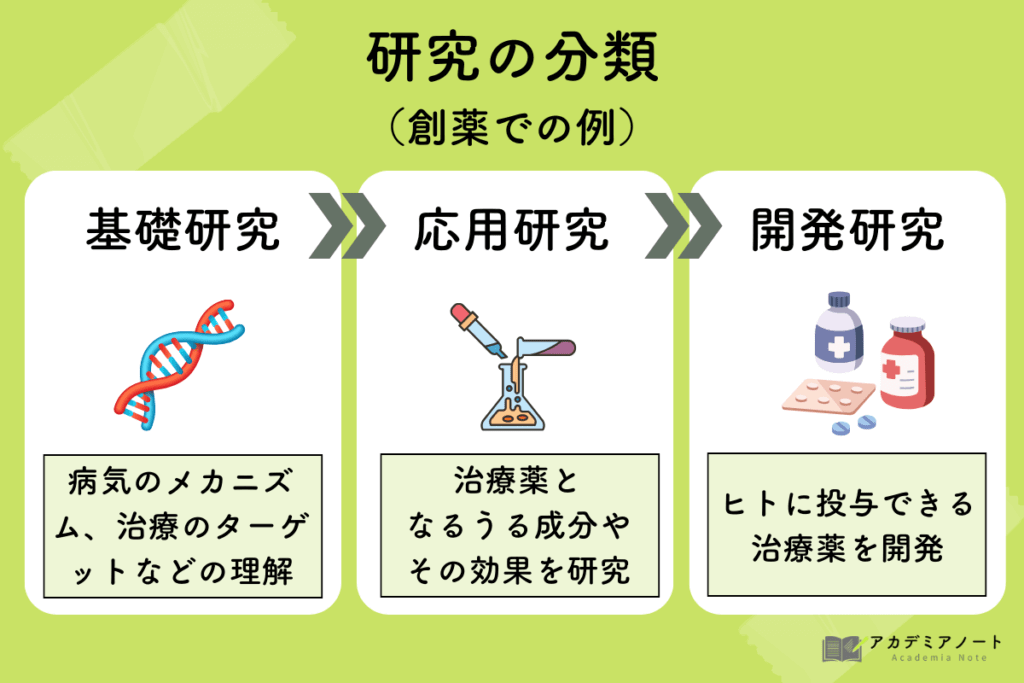
Much of basic research is aimed at finding out the truth.
Therefore, it can continue over a longer period of time than applied or development research.
 Akanon
AkanonBasic research is not suitable for companies that need to generate profits.
Academia is the center.
What kind of environment does a researcher work in?

As of March 31, 2021 (Statistics Bureau, Ministry of Internal Affairs and Communications)
As of 2021, there will be approximately 890,500 researchers in the country.
A researcher here means ”a person who has completed a course at a university (excluding junior college) (or a person who has expertise equivalent or superior to such a course) and is conducting research on a specific theme. ) who have completed a course of study at a university (excluding junior college) (or those with equivalent or greater expertise) and who are conducting research on a specific theme. It also includes those enrolled in a graduate doctoral program.” It is defined as.
◆ University (Academia)(336,800 people)
◆ business 515,500
◆ public research institution 38,200 people
 Akanon
AkanonSo the most common are companies.
How to become a researcher?
How to become a researcher in academia
Graduate schools are divided into master's (first semester of doctoral program) and doctoral (second semester of doctoral program) programs.
There are two ways to enter graduate school.
That is, do you work for a company or other organization while attending graduate school?
- Typical graduate student: academic only
- Working graduate students: attend graduate school while working at a company, etc.
Most university faculty members have Ph.D. degrees, and in many cases a Ph.D. is required to apply for university faculty positions.
D. degree will be awarded upon completion of the doctoral program with the required accomplishments (number of papers, etc.) and approval by the Faculty Council.
Criteria for awarding the doctoral degree vary from department to department at each university.
Openings for university faculty areJrecInYou can find them on a government-run job site called
In other cases, you may be hired as a faculty member directly at the laboratory you belonged to during your graduate school days, or you may be unofficially recommended by other researchers.
How to become a corporate researcher
It is necessary to be employed in a research position in a company.
In such cases, a master's degree or higher is often required.
What is the difference between a researcher in academia and a researcher in a company?
It is very important to have a good understanding of the differences between researchers in academia and in industry.
Differences in the way of being a researcher

Researchers working in academia are known as "university faculty".
There is a pecking order for university faculty: assistant professor < lecturer < associate professor < professor.
 Akanon
AkanonThe word "researcher" in the public mind is associated with "professor" or "associate professor," isn't it?
Differences in research direction
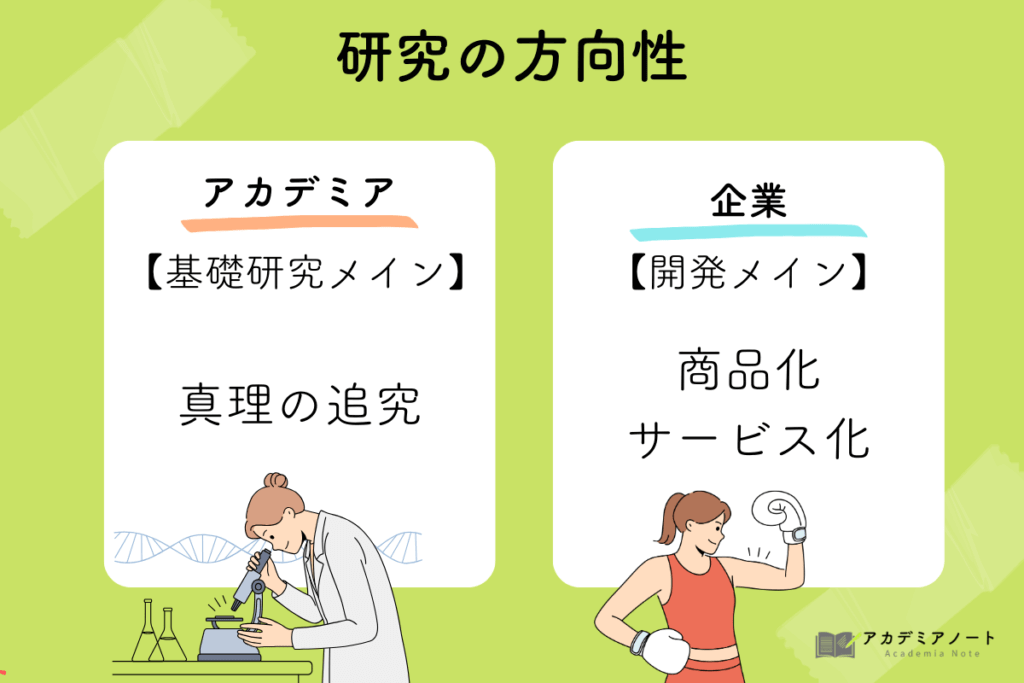
Compared to universities and public research institutions, companies have a different research orientation.
In a company, the main focus is on research and development for making products and services, because it must lead to profits for the company.
In other words, the span of research tends to be shorter in companies than in academia.
Check out the advantages and disadvantages article on corporate researchers to see the differences.

 Akanon
AkanonIt may not be right for you.
Differences in Duties
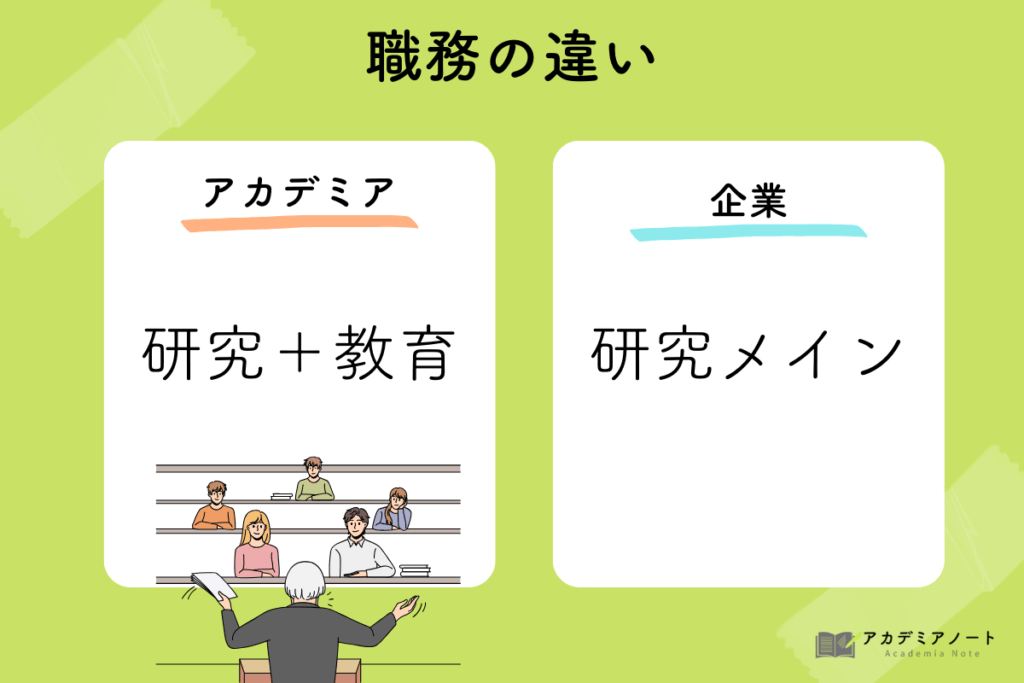
Researchers working in academia have a serious job, comparable to their research, of educating students.
This will vary widely by department and major, but will involve several lecture sessions per week.
*Assistant professors and tenure-track faculty (see below) have no or much fewer lectures.
Among researchers in academia, we see many professors whose teaching is (or has become) more important than their research.
 Akanon
AkanonEducation is such an important job.
Difference in employment status
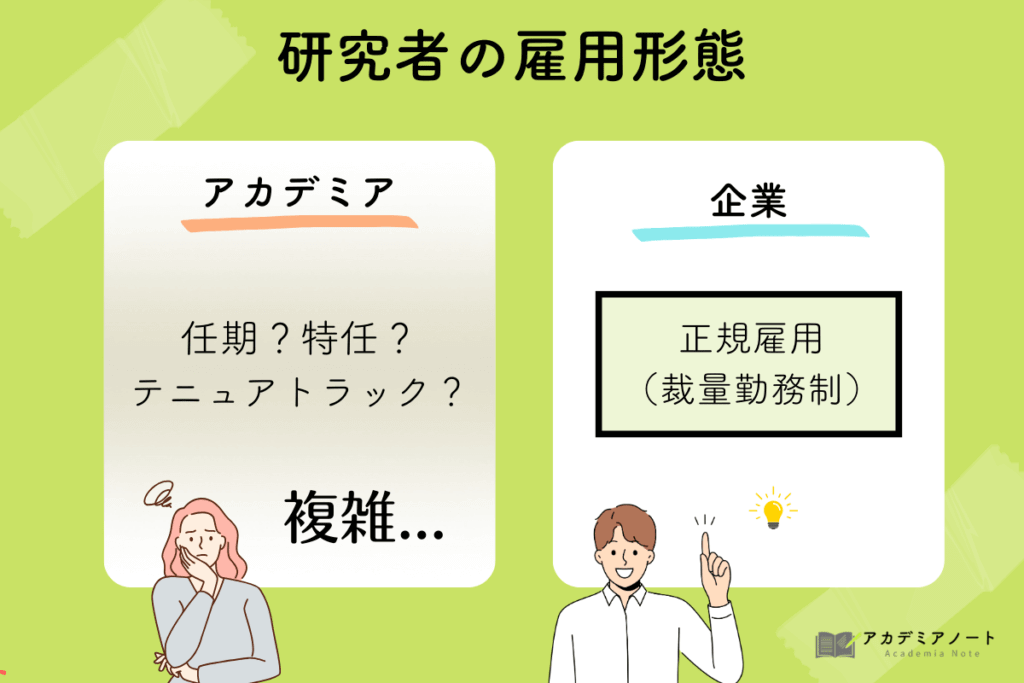
Most researchers working in companies are company employees with full-time jobs.
One distinctive feature is that discretionary work systems are often in place.
A "labor contract in which working hours are left to the discretion of the worker."
Simply put, "Longer or shorter working hours have nothing to do with your salary.」Institution.
In other words, there is no concept of overtime work and no overtime pay.
On the other hand, employment in academia is far removed from that of a typical company employee and is considerably more complex.
There are three points that complicate the process
- Term of office
- Full-time or part-time (full-time or part-time)
- Difference in employer
Aspiring researchers in academia need to know about this complex employment.
Diversified Employment Opportunities in Academia

The table below provides a detailed breakdown by term of office, hours of service, and employer.
| social status | term of office | office (business, working) hours | employer |
|---|---|---|---|
| university faculty | nashi (Pyrus pyrifolia, esp. var. culta) | full-time employment | post-secondary education institution, incl. university, college, etc. |
| university faculty (tenure track) | ant *By examination Can be moved to no term of office. | ||
| university faculty (with term of office) | ant | ||
| university faculty (Specially Appointed) | Research expenses, etc. | ||
| postdoctoral researcher (Full-time) | |||
| postdoctoral researcher (Part-time) | part-time work |
 Akanon
AkanonThere's such a diversity of employment options for researchers.
The different types of employment for university faculty are also summarized in this article> >

One of the most important employment systems for young researchers is the tenure track system.
You can read more about the tenure-track system here, including its benefits and how to apply for a position.>>>
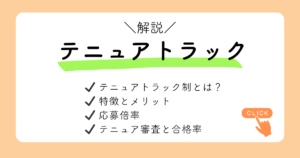
A postdoctoral fellow is a non-tenured researcher with a fixed term of employment.
It is estimated that there are currently 15,000 post-doctoral fellows.
 Akanon
AkanonIt is easier to understand if you view it as a training period for researchers.
For more information, please see this article.> >
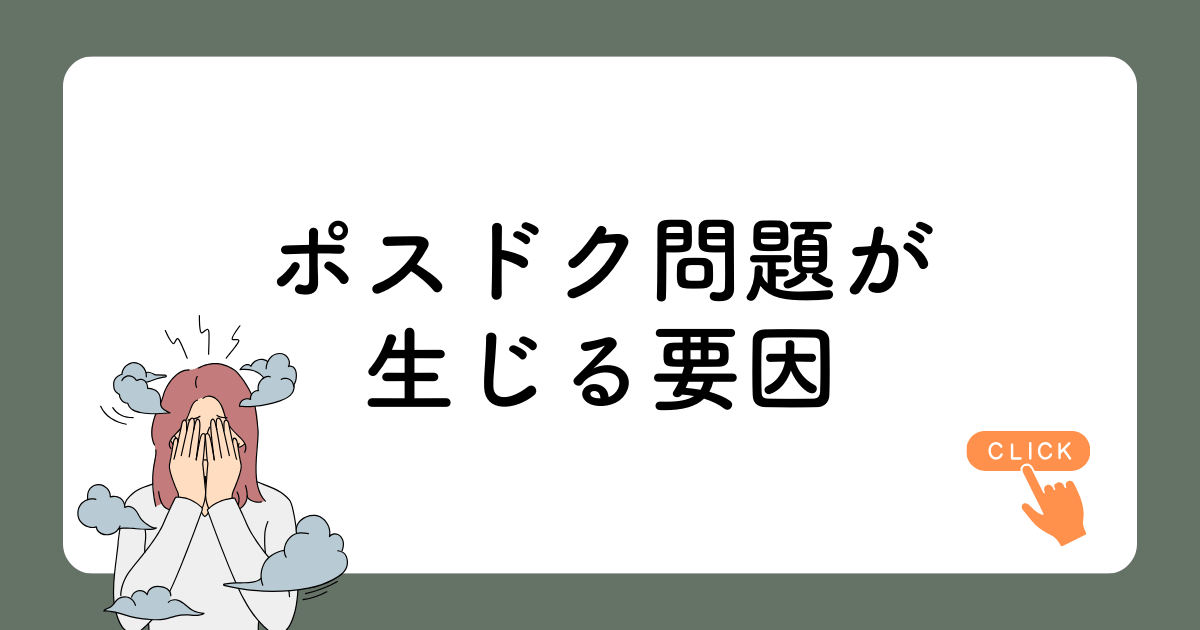
Researcher's annual salary
Researchers tend to have higher annual incomes than other occupations.
Annual income of researchers working in academia
| average age | Annual income (ten thousand yen) | |
|---|---|---|
| assistant teacher | 41.7 | |
| lecturer | ||
| associate professor | 48.0 | |
| professor | 56.8 |
Assistant Professor and Lecturer:Ministry of Health, Labour and Welfare, "Basic Survey on Wage Structure in 2028.、2028 "Statistical Survey of School Teachers by Monthly Salary and Job Title" (in Japanese)More Considerations
Annual income of researchers working in companies
| average age | Annual income (ten thousand yen) | |
|---|---|---|
| whole | 41.1 | |
| More than 1,000 employees | 40.8 | |
| 100 to 999 employees | 41.2 | |
| 10 to 99 employees | 43.8 | |
The average annual salary in Japan is about 6 million even for those in their 50s or older, so the annual salary for researchers is high.
For more information about other public research institutions and post-doctoral income, please refer to this article.>>>

The researcher's suitability for the job.
In fact, there are many researchers who quit their research careers despite having aspired to be researchers and even entered graduate school with excellent grades.
 Akanon
AkanonVery many people suffer from research and leave with mental illness.

Eh, but isn't it a group of excellent people?
As for whether excellence makes a good researcher...
 Akanon
AkanonThat could be a big mistake.
Cases of people leaving the research profession are those that are personality-driven.Suitability for researchhas a lot to do with this.
Please check the following 8 items to confirm your suitability as a researcher.
- Can you maintain your quest for the unknown?
- Can you immerse yourself?
- Can you make an effort to generate ideas?
- Can we go our own way?
- Do you have the power to ask?
- Can you turn failure into a positive?
- Do you have passion?
- Are you ready for action?
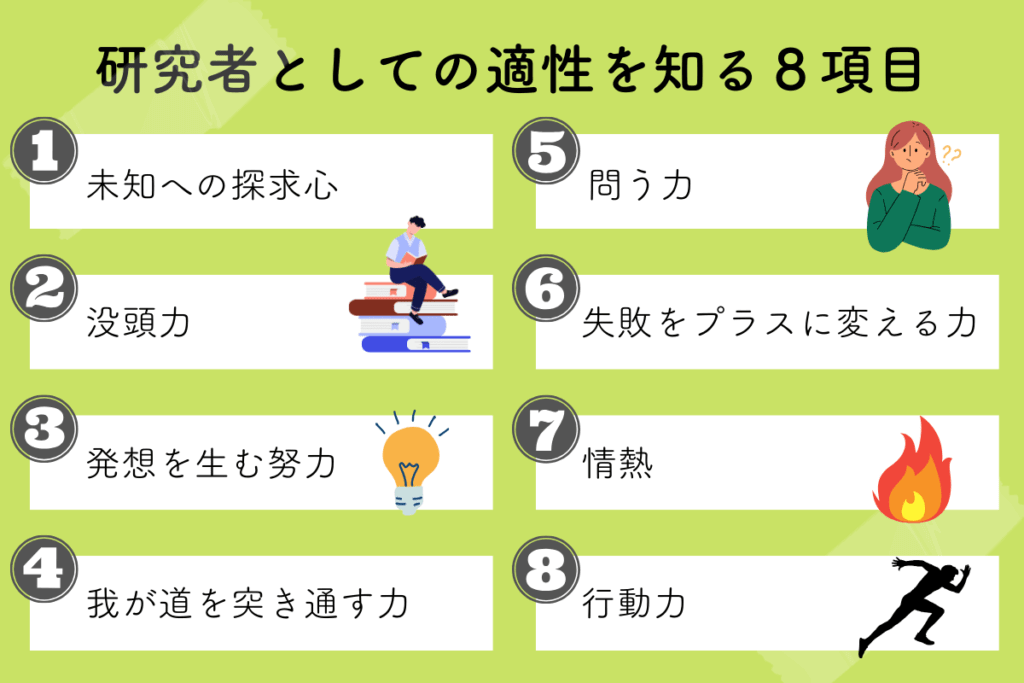
In this article,Quotes from great Nobel Prize-winning researchersand provides a detailed checklist to confirm your suitability as a researcher.

 Akanon
AkanonAspiring researchers should check it out at least once!
summary
This issue is packed with information for aspiring researchers from the following perspectives
Being a researcher is a deeply rewarding and very attractive profession.
You should definitely go for it!
 Akanon
AkanonThank you for reading to the end.
Article updates are also posted on X and Instagram.
Please follow us and check it out!
- click here
- Click here for the installation.
- Click here for YouTube (in preparation)
- Click here for NOTE
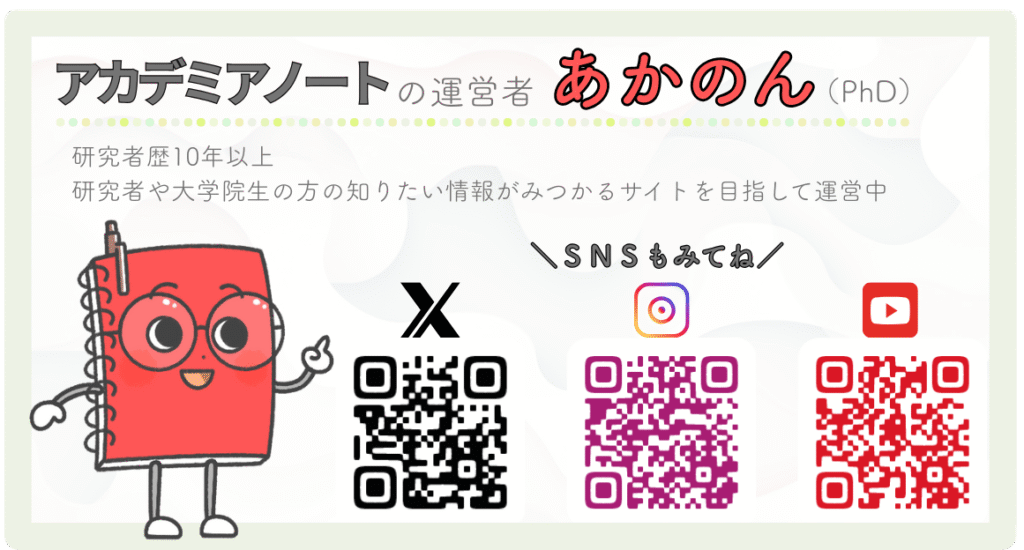
request
Thank you for taking the time to read this article.
This is a personal site that the operator updates little by little in between his personal life.
If you found the content of this site helpful,
We would be happy to receive feedback on social networking sites.
The feedback we receive will encourage us to create future articles.
-

What are the characteristics of people who are and are not suited to be researchers?
-

Complete coverage] Researchers' annual income|All information from universities, companies, public research institutes, and post-doctoral researchers is disclosed.
-
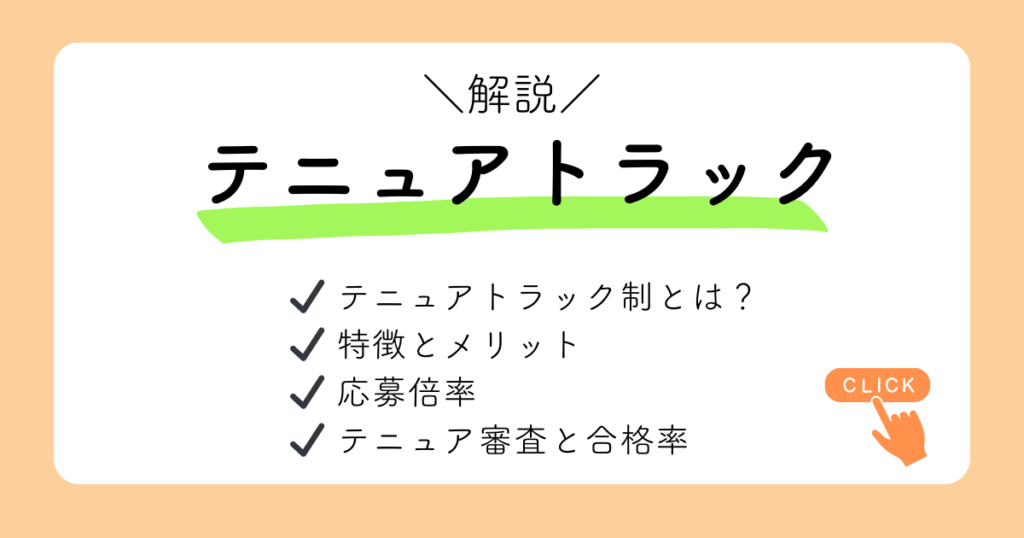
Summary] What is the Tenure Track System? Explanation of an important employment system for researchers!
-

[Statistics show that academia is having difficulty finding jobs] Four causes are explained in detail.
-

Explains the advantages and disadvantages of becoming a corporate researcher (de-academia).
-

Understanding the Employment Status of University Faculty Members] Explaining the differences between tenure-track and specially-appointed assistant professors in an easy-to-understand manner.

